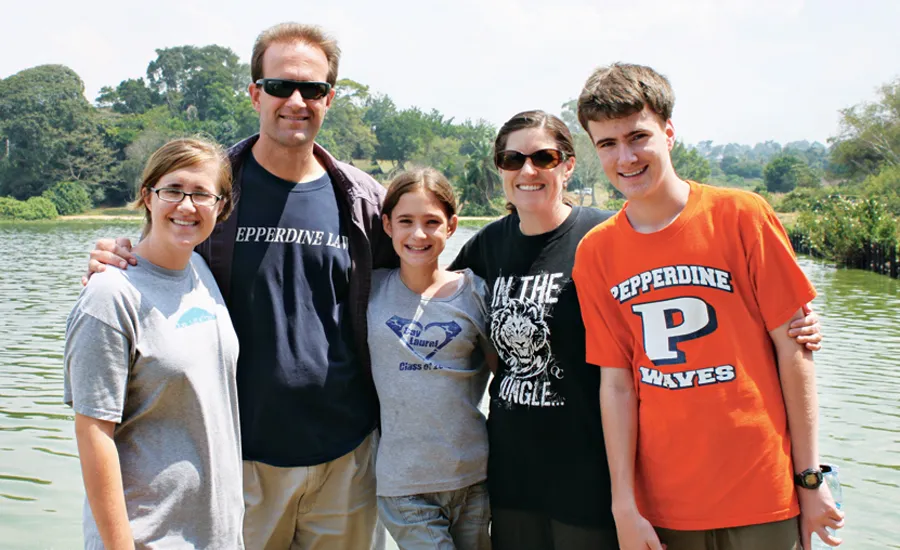I’d had it all figured out. I’d take a six-month sabbatical from my teaching job at Pepperdine Law School to help juveniles caught up in the slow-moving Ugandan criminal-justice system get access to justice. Not just me—my whole family would go.
My wife, Joline, and I thought we could get our two daughters, Jessica, 15, and Jennifer, 11, and our 13-year-old son, Joshua, involved with a nonprofit organization working at a Ugandan juvenile-detention facility.
That we’d made it to Kampala, the capital, was miracle enough. When I’d first sprung the sabbatical idea on the kids the reaction was, well, mixed. Our two girls were definitely not into it. “What would we do all that time?” Jessica asked. “Who would our friends be? Where would we go to school?” Jennifer asked. Only Joshua was psyched.
FOR MORE INSPIRING STORIES, SUBSCRIBE TO GUIDEPOSTS!
“We’ll all pray about it,” Joline had said. My family knew about my passion for bringing justice to kids in Uganda. I’d made more than half a dozen trips there in the past two years, working to help a 16-year-old boy named Henry who’d been wrongly accused and convicted of murder.
Henry and I talked a lot on the phone and I’d arranged for more than a dozen Ugandan judges to come to California for training.
It was challenging work, demanding all my resources—spiritual, intellectual and organizational. Naturally I talked about this with my family, but as a parent you don’t want to be just talking at your kids all the time. You want them to experience what brings you closer to God.
Our children were growing up. Soon they’d be going off to college. We were already pulled in a dozen directions at once—school, work, church, sports. Couldn’t we all go on a spiritual journey, do something that would bond us forever—like serving God as a family in Africa?
READ MORE: A LAWYER PUTS HIS FAITH INTO PRACTICE IN UGANDA
Our prayers were heard and the pieces came together. Joline coordinated with the kids’ schools. She could homeschool our younger two in Uganda, and Jessica could keep up with her high school classes online.
As for friends, it turned out that another American family, the Gregstons, with three kids exactly the same ages as ours, would be based in Kampala while we were there. The dad, Jay, was a doctor who’d be working pro bono with the poor.
We rented a three-bedroom apartment in the not-as-grand-as-it-sounds Royal Suites in Kampala. The Gregstons took an apartment downstairs. This would be home for six months.
Some days, our kids would do schoolwork; the rest of the time they would volunteer with the group I’d found that did good work in the juvenile prisons. I pictured our family coming together in the evenings to swap stories about fighting for justice.
But again and again, as I’ve seen in Uganda, just when you think you’ve got things all figured out, they can change. Drastically.
The day before I was going to take the kids over to the juvenile penitentiary, I learned from the people at the nonprofit group that they had been booted out of the prison—their papers hadn’t been approved (this after they’d already been working there for 18 months). They were apologetic. Maybe they’d get approved to go back in a couple of months.
What would our family do in the meantime? So much for our spiritual adventure.
That night we had dinner with the Gregstons. “I’m trying to figure out what project our family can do during the day while I work with the judiciary,” I said to Jay.
“They can join us,” Jay said without hesitating. Several times a week he and his family ran mobile clinics in the countryside or the slums. While he and a Ugandan doctor and two nurses treated people, his wife and kids registered patients and filled prescriptions. “We can always use more hands.”
I looked to Joline. “It would be a real chance to help,” she said.
“We could see more of Uganda too,” said Jennifer.
“I want to do it!” said Jessica, who dreamed of becoming a nurse someday, despite a serious fear of needles.
The kids and Joline left with the Gregstons first thing in the morning, piling into a dusty old van. I had meetings all day. That night, I came home to find the two families gathered for homemade pizza. “How’d it go?” I asked, putting down my briefcase and taking off my tie.
“Awesome,” Joshua said.
“I sat at the registration desk,” Jennifer said.
“I learned how to draw blood today,” Jessica said. I turned to Joline in disbelief. I don’t know if I was more shocked that Jessica had been willing to handle needles or that Joline had allowed it to happen.
“She wore sterile gloves,” Joline said.
“The Ugandan doctor taught me how to do it,” Jessica told me. She and the Gregstons’ oldest son had learned together. “We tested the blood for HIV and malaria.”
“It was very safe,” Jay reassured me. “I wouldn’t let the kids do it otherwise.”
Our days took on a new rhythm. Early morning workouts at the Royal Suites gym, legal work for me, schoolwork or medical trips for the family, evenings at home.
Sundays we went to a Pentecostal church. Worship began with what felt like an intense cardio session—20 minutes of singing and dancing that challenged every nonrhythmic bone in my body. Far different from what we were used to, but wasn’t that the point?
We took family trips, white-water rafting, bungee-jumping, going on safari. One of the most important was to visit Henry, the boy I’d been helping, and his family. By now he was out of the juvenile prison and going to school in Kampala, where we lived. He could be our guide and translator.
We drove for hours on rutted one-lane roads and finally pulled up to a small concrete box. Henry’s family streamed out to greet us: his sister, his older brother and younger brother, and his parents. They invited us inside through a curtained entry. We squeezed into chairs or found places on the floor. Henry’s mother brought out a feast—two kinds of meat, rice, potatoes, soup, chapatis, carrots, tomatoes, pineapples, bananas, papayas, popcorn, sodas and bottled water.
I kicked myself for not telling Henry they didn’t need to fix anything for us. They could hardly afford it. But then, I don’t think his mother would have listened. Ugandans are legendary for their hospitality.
The next morning we went to Henry’s church. Even this early—7:30 a.m.—the church was hopping. The song leaders, flanked by singers in matching red silk shirts and black pencil skirts, bounced up and down on the concrete stage. The keyboard player, dripping with sweat, danced as he played. “Is God moving anyone to share a word of thanksgiving?” the pastor shouted.
A dozen hands shot up, including Henry’s and his mother’s. Henry took the stage and said how grateful he was for my family. Then Henry’s mom thanked God for her guests, emphasizing the possessive.
Joline brought greetings from her women’s Bible study in Malibu, saying they had prayed often for Henry and his family.
At the end of the service the pastor asked the congregation to come forward and say a blessing over our family. All at once we were surrounded by a group of total strangers, touching our heads, faces and hands, fervently praying in English and their native Runyoro. It was one of the most moving things I had ever experienced.
Back in the van we were all silent for a while. “Dad, I always thought that coming to Uganda, we would be the givers. We would be the ones sharing our faith,” Jessica said. “But it really worked both ways, didn’t it?”
Joline and I could see a new sense of empowerment in our kids, a confidence in their ability to help. Things didn’t rattle them. They’d always been responsible kids, but now they were helping treat people with malaria, intestinal parasites and HIV, taking on responsibilities that were much bigger than what they ever would have faced back home.
In the evenings, without the usual distractions, we spent time talking and just being together. One night Joshua described a soccer ball one of the kids was kicking around outside at the clinic. “Dad, it was made of newspapers,” he said. “That’s all, newspapers tied together. I keep thinking about how many balls we have back home.”
Daily our children were getting a new perspective on things they took for granted. We could hear it in our conversations and in their prayers. The poor they prayed for now had a face.
Jennifer spoke about a boy who lingered by a clinic all day, long after he’d been treated. “He just wanted to say thank you. That was all.” She put down how she felt in a blog: “I know God is always with me, but sometimes there are places where the signal sort of gets weaker. The signal is strongest in Uganda.”
We’re back in California now, but all three kids have returned to Uganda on mission trips. Jessica’s in college and was so inspired by her clinic work in Africa that she’s planning to go to medical school.
I’ll never forget what she said when we first returned to the States. Our house resumed its usual hectic pace, friends coming and going, homework, sports. It was a challenge balancing our schedules so that we could sit down and have dinner a few times a week with everybody there.
“I want to go home,” Jessica said.
“But you are home,” I said.
“I know, but everything has changed. I have changed.”
We felt called to a place where we hoped we could make a difference. But the biggest difference has been the change in us, opening our hearts to the adventures that God has in store for us as a family.
More from Jim Gash: How to Give Your Family a Spiritual Adventure
Did you enjoy this story? Subscribe to Guideposts magazine.





